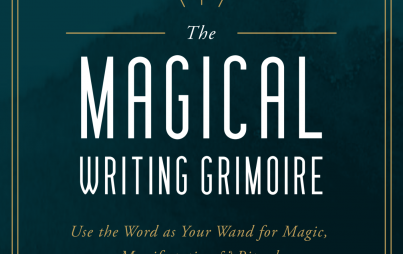Lisa Marie Basile
Bio
Lisa Marie Basile is the founding creative director of Luna Luna Magazine--a popular magazine focused on literature, magical living, and identity. She is the author of "Light Magic for Dark Times," a modern collection of inspired rituals and daily practices, as well as "The Magical Writing Grimoire: Use the Word as Your Wand for Magic, Manifestation & Ritual." She can be found writing about trauma recovery, writing as a healing tool, chronic illness, everyday magic, and poetry. She's written for The New York Times, Refinery 29, Self, Chakrubs, Marie Claire, Narratively, Catapult, Sabat Magazine, Healthline, Bust, Hello Giggles, Grimoire Magazine, and more. Lisa Marie has taught writing and ritual workshops at HausWitch in Salem, MA, Manhattanville College, and Pace University. She earned a Masters's degree in Writing from The New School and studied literature and psychology as an undergraduate at Pace University.
Lisa Marie Basile Articles
Remember that your body is you, it is not separate. Treat it, yourself, with love. You’re a body of magic.
Read...The sum of a city isn’t always made up of its parts.
Read...Anxiety disorders — PTSD, OCD, and Panic Disorder, to name a few — are the most common mental illnesses in the United States, with about 18% of the population struggling with one. No one wants to be put on blast for their weaknesses or wiring issues. I just wish there was a way to better understand the silent majority — the people who suffer every day.
Read...This article first appeared on Luna Luna and has been republished with permission.
I am fortunate to receive tons of wonderful books on a wide range of topics, but some of my favorites include those by talented witches and magical beings whose books approach magic in accessible, inclusive, radical, and fresh ways.
I am always on the lookout for books which a) present an updated look at magic and witchcraft to a modern audience, b) frame witchcraft in a way that is inclusive and holistic — meaning it addresses systemic issues in society, and c) blend and blur genres — books of narrative non-fiction alongside research, poetry entwined with spellcraft, or divination techniques alongside storytelling.
Read...Like a lot of people with chronic illness or autoimmune/autoinflammatory disorders, I went through a dead-end labyrinth to get my diagnosis.
Read...The fact of the matter is that content mills are dangerous and personal essays are a different beast. And there’s a vast level of discrepancy between a phone-it-in XYZ — and a Here’s What It Feels Like piece and other essays, where the language sings and the story is backed up by reportage. I’m aware of this. But there is also a middle ground.
Read...It’s Monday, 6 a.m. and Sarah, 30, wakes up — as she does five days a week (but really, it’s seven, because the body is a fickle thing).
Read...I grew up knowing my family always had its very own black cloud. Like a backyard pet that comes and goes when it pleases, a room locked but filled with things we weren’t allowed to look at or set free. And it was all passed down to me like some broken heirloom — my ancestor’s weaknesses and fears, swirled into DNA’s mad ritual. Does the body sometimes take into itself — take from its creators — what it cannot heal from? Sometimes, yes.
Read...When the spread was published, all the girls in the shot were small — small enough to notice their not-bigness. It was the first time I felt “othered,” the first time I noticed how some versions of thin weren’t thin enough.
Read...













